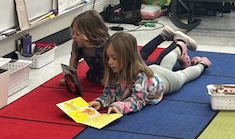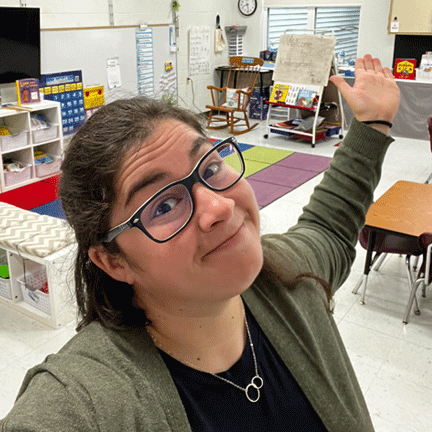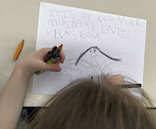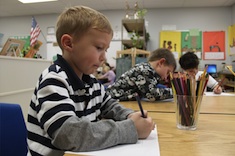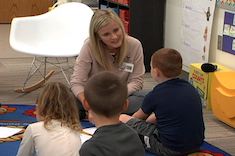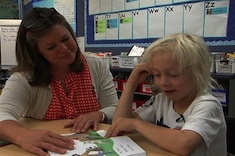It was the last Monday of kindergarten…You can imagine the level of exhaustion I was feeling as I did lunch count and attendance for the 171st time that year. (And today I would actually be submitting it on time…That is not a common occurrence!)
Isla walked up to me with her favorite Elephant and Piggie book and said, “Mrs. Burk, can you read this to us one last time as kindergartners?”
The moment stopped me in my tracks.
This question indicated not only that the kids were feeling the finality of the week but also the power that books held in our community. In that moment I chose to follow her lead, and I told her we absolutely could read that book again.
Then after morning meeting, I handed each child a sticky note and had them write their name on it. As they came back to the rug, I asked them to think about a book they loved to hear read to them, one they’d like to hear one last time in kindergarten.
They hadn’t fully mastered the concept that thinking can be in your head, but they were fully proficient at thinking out loud, and the rug became abuzz with all the favorites. They talked about Piggie and Gerald, Lola, Penguin, Waldo, Fly Guy, and so many more…
One by one they picked the book they wanted to hear one last time, placed the sticky note with their name on the cover, and set it on the ledge of our morning meeting board.
It was fascinating to watch them go directly to the bin their book was in and clutch it as they walked the few steps to the morning meeting board. I heard several children say, “Oh, man, that’s what I was going to pick,” and then quickly think of another title they wanted to hear read aloud.
Slowly the collection of class favorites grew, and my eyes grew teary. It was like watching their personalities being collected in a display. I could think back to the moment we had read each book and connect to why that child loved the book so much.
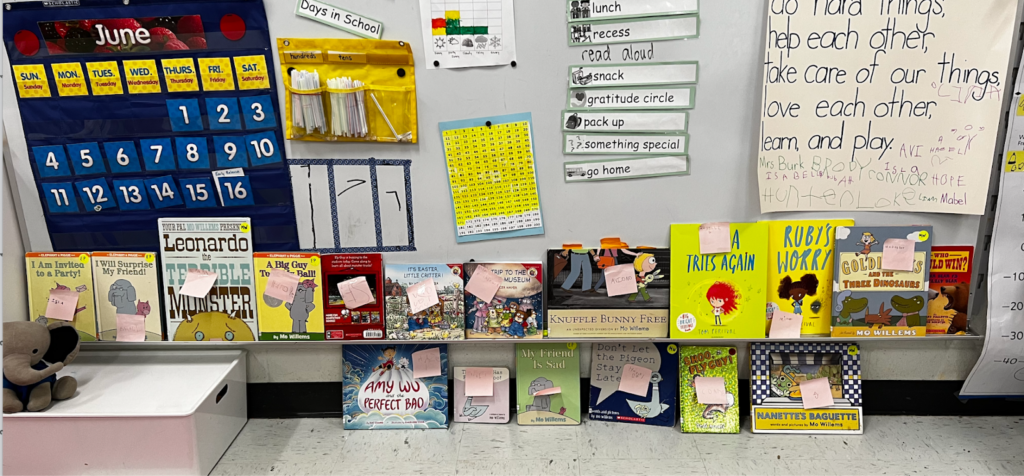
It was a natural time of year to reflect and notice how much each child had grown. That year was like no other…but isn’t that the case every year? It seems to be that way for me.
Thinking back, I find the power of workshop in supporting students as readers glaringly obvious. We are facing a reality where the very foundation of what we do and how we do it is being questioned. The whole debate around reading instruction makes me self-conscious and anxious at times. I know that workshop had been the vehicle in my classroom to build confidence and skills in young readers. I’ve watched it work over and over again, but what if these vocal advocates against workshop are right?
At times, I’ve considered workshop principles magical. This makes me wonder, What is the magic? What is workshop rooted in that makes the magic happen?
One piece of the foundation of workshop is the focus on students’ voices and identities as readers. Children feel empowered, valued, and seen every day as part of the workshop. In small groups and conferences, partner reading and shares, children hear how their work matters, how they can improve, and why it is important.
Another block in the foundation of workshop is the way in which the structure allows for direct, differentiated instruction for children as individuals. So much of current research is showing how differently each child learns. Small groups and conferences allow teachers to home in on the specific learning styles and needs of each child in their class. Workshop gives purpose to the work being done; it is an authentic literacy experience giving meaning to the learning children are doing.
Isla’s question, “One last time?” affirmed what I’ve known in my heart all along. Workshop is more than magic. Choice, authentic purpose, and true time in good books…targeted, differentiated instruction, phonics, interactive read aloud, shared reading, conferring, and small groups create the environment where children find their reading identities.
Isla is a reader. Isla sees herself as a reader, a lover of books. You wouldn’t know that Isla entered kindergarten unable to recognize her name or identify letters or sounds. You wouldn’t know that her twin sister took to reading at a very young age while Isla was off playing other things. So how is it that Isla learned to read? How did she come to be a lover of books, so much so that she had a natural yearning to hear an old favorite one last time?
It starts at the beginning. It happens moment by moment. As children collect experiences with books in their hearts and in their minds, they slowly build their reading identity. Every moment with a book counts toward that identity.
When the children walk through the door for the first time, what is the first feeling you want them to have? Is it belonging or comfort? Perhaps excitement or hope? Is it understanding or familiarity?
How will you create a collective experience to evoke that feeling?
One surefire way to evoke a feeling in a group of kids is to immerse them in an engaging read aloud.
As teachers, we have a significant influence on this reading identity…and with that influence comes great responsibility. We are living in tumultuous times in education and as a society, and now more than ever, it is critical that we help our students become critical thinkers, problem solvers, empathetic listeners, and confident citizens.
My class is full of kids with a wide variety of skills in reading. Some are able to use far more strategies than others, and yet when it was time for them to pick their book to hear one last time, all 18 of my students had one in mind. Some struggled to choose just one. Some children in my class struggle to name letter sounds even now…but they still have favorite books. Each child in my class has a reading identity; every one is a reader.

